Here’s the image that inspired this post:
Now, there’s an awful lot of political catnip in that post, but I’m actually going to ignore it. So, if you want to hate on Captain Marvel or defend Captain Marvel: this is not the post for you. I want to talk about an apolitical disagreement I have with this perspective.
The underlying idea of this argument is that you should rate a movie based on how good or bad it is in some objective, cosmic sense. Or at least based on something other than how you felt about the movie. In this particular case, you should rate the movie based on some political ideal or in such a way as to promote the common good. Or something. No, you shouldn’t. ALl of these approaches are bad ideas.
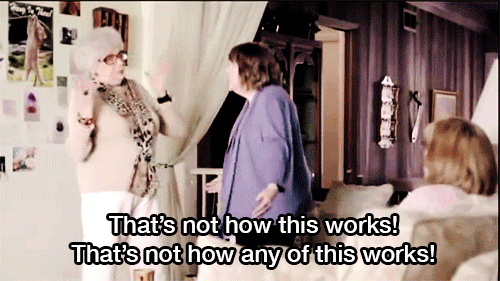
The correct way to rate a movie–or a book, or a restaurant, etc.–is to just give the rating that best reflects how much joy it brought you. That’s it!
Let’s see if I can convince you.
To begin with, I’m not saying that such a thing as objective quality doesn’t exist. I think it probably does. No one can really tell where subjective taste ends and objective quality begins, but I’m pretty sure that “chocolate or vanilla” is a matter of purely personal preference but “gives you food poisoning or does not” is a matter of objective quality.
So I’m not trying to tell you that you should use your subjective reactions because that’s all there is to go on. I think it’s quite possible to watch a movie and think to yourself, “This wasn’t for me because I don’t like period romances (personal taste), but I can recognize that the script, directing, and acting were all excellent (objective quality) so I’m going to give it 5-stars.”
It’s possible. A lot of people even think there’s some ethical obligation to do just that. As though personal preferences and biases were always something to hide and be ashamed of. None of that is true.
The superficial reason I think it’s a bad idea has to do with what I think ratings are for. The purpose of a rating–and by a rating I mean a single, numeric score that you give to a movie or a book, like 8 out of 10 or 5 stars–is to help other people find works that they will enjoy and avoid works that they won’t enjoy. Or, because you can do this, to help people specifically look for works that will challenge them and that they might not like, and maybe pass up a book that will be too familiar. You can do all kinds of things with ratings. But only if the ratings are simple and honest. Only if the ratings encode good data.
The ideal scenario is a bunch of people leaving simple, numeric ratings for a bunch of works. This isn’t Utopia, it’s Goodreads. (Or any of a number of similar sites.) What you can then do is load up your list of works that you’ve liked / disliked / not cared about and find other people out there who have similar tastes. They’ve liked a lot of the books you’ve liked, they’ve disliked a lot of the books you’ve disliked, and they’ve felt meh about a lot of the books you’ve felt meh about. Now, if this person has read a book you haven’t read and they gave it 5-stars: BAM! You’re quite possibly found your next great read.
You can do this manually yourself. In fact, it’s what all of us instinctively do when we start talking to people about movies. We compare notes. If we have a lot in common, we ask that person for recommendation. It’s what we do in face-to-face interactions. When we use big data sets and machine learning algorithms to automate the process, we call them recommender systems. (What I’m describing is the collaborative filtering approach as opposed to content-based filtering, which also has it’s place.)
This matters a lot to me for the simple reason that I don’t like much of what I read. So, it’s kind of a topic that’s near and dear to my heart. 5-star books are rare for me. Most of what I read is probably 3-stars. A lot of it is 1-star or 2-star. In a sea of entertainment, I’m thirsty. I don’t have any show that I enjoy watching right now. I’m reading a few really solid series, but they come out at a rate of 1 or 2 books a year, and I read more like 120 books a year. The promise of really deep collaborative filtering is really appealing if it means I can find is valuable.
But if you try to be a good citizen and rate books based on what you think they’re objective quality is, the whole system breaks down.
Imagine a bunch of sci-fi fans and a bunch of mystery fans that each read a mix of both genres. The sci-fi fans enjoy the sci-fi books better (and the mystery fans enjoy the mystery books more), but they try to be objective in their ratings. The result of this is that the two groups disappear from the data. You can no longer go in and find the group that aligns with your interests and then weight their recommendations more heavily. Instead of having a clear population that gives high marks to the sci-fi stuff and high-marks to the mystery stuff, you just have one, amorphous group that gives high (or maybe medium) marks to everything.
How is this helpful? It is not. Not as much as it could be, anyway.
In theoretical terms, you have to understand that your subjective reaction to a work is complex. It incorporates the objective quality of the work, your subjective taste, and then an entire universe of random chance. Maybe you were angry going into the theater, and so the comedy didn’t work for you the way it would normally have worked. Maybe you just found out you got a raise, and everything was ten times funnier than it might otherwise have been. This is statistical noise, but it’s unbiased noise. This means that it basically goes away if you have a high enough sample.
On the other hand, if you try to fish out the objective components of a work from the stew of subjective and circumstantial components, you’re almost guaranteed to get it wrong. You don’t know yourself very well. You don’t know for yourself where you objective assessment ends and your subjective taste begins. You don’t know for yourself what unconscious factors were at play when you read that book at that time of your life. You can’t disentangle the objective from the subjective, and if you try you’re just going to end up introducing error into the equation that is biased. (In the Captain Marvel example above, you’re explicitly introducing political assessments into your judgment of the movie. That’s silly, regardless of whether your politics make you inclined to like it or hate it.)
What does this all mean? It means that it’s not important to rate things objectively (you can’t, and you’ll just mess it up), but it is helpful to rate thing frequently. The more people we have rating things in a way that can be sorted and organized, the more use everyone can get from those ratings. In this sense, ratings have positive externalities.
Now, some caveats:
Ratings vs. Reviews
A rating (in my terminology, I don’t claim this is the Absolute True Definition) is a single, numeric score. A review is a mini-essay where you get to explain your rating. The review is the place where you should try to disentangle the objective from the subjective. You’ll still fail, of course, but (1) it won’t dirty the data and (2) your failure to be objective can still be interesting and even illuminating. Reviews–the poor man’s version of criticism–is a different beast and it plays by different rules.
So: don’t think hard about your ratings. Just give a number and move on.
Do think hard about your reviews (if you have time!) Make them thoughtful and introspective and personal.
Misuse of the Data
There is a peril to everyone giving simplistic ratings, which is that publishers (movie studios, book publishers, whatever) will be tempted to try and reverse-engineer guaranteed money makers.
Yeah, that’s a problem, but it’s not like they’re not doing that anyway. The reason that movie studios keep making sequels, reboots, and remakes is that they are already over-relying on ratings. But they don’t rely on Goodreads or Rotten Tomatoes. They rely on money.
This is imperfect, too, given the different timing of digital vs. physical media channels, etc. but the point is that adding your honest ratings to Goodreads isn’t going to make traditional publishing any more likely to try and republish last years cult hit. They’re doing to do that anyway, and they already have better data (for their purposes) than you can give them.
Ratings vs. Journalism
My advice applies to entertainment. I’m not saying that you should just rate everything without worrying about objectivity. This should go without saying but, just in case, I said it.
You shouldn’t apply this reasoning to journalism because one vital function of journalism for society is to provide a common pool of facts that everyone can then debate about. One reason our society is so sadly warped and full of hatred is that we’ve lost that kind of journalism.
Of it’s probably impossible to be perfectly objective. The term is meaningless. Human beings do not passively receive input from our senses. Every aspect of learning–from decoding sounds into speech to the way vision works–is an active endeavor that depends on biases and assumptions.
When we say we want journalists to be objective, what we really mean is that (1) we want them to stick to objectively verifiable facts (or at least not do violence to them) and (2) we would like them to embody, insofar as possible, the common biases of the society they’re reporting to. There was a time when we, as Americans, knew that we had certain values in common. I believe that for the most part we still do. We’re suckers for underdogs, we value individualism, we revere hard work, and we are optimistic and energetic. A journalistic establishment that embraces those values is probably one that will serve us well (although I haven’t thought about it that hard, and it still has to follow rule #1 about getting the facts right). That’s bias, but it’s a bias that is positive: a bias towards truth, justice, and the American way.
What we can’t afford, but we unfortunately have to live with, is journalism that takes sides within the boundaries of our society.
Strategic Voting
There are some places other than entertainment where this logic does hold, however, and one of them is voting. One of the problems of American voting is that we go with majority-take-all voting, which is like the horse-and-buggy era of voting technology. Majority-take-all voting is probably much worse for us than a 2-party system, because it encourages strategic voting.
Just like rating Captain Marvel higher or lower because your politics make you want it to succeed or fail, strategic voting is where you vote for the candidate that you think can win rather than the candidate that you actually like the most.
There are alternatives that (mostly) eliminate this problem, the most well-known of which is instant-runoff voting. Instead of voting for just one candidate, you rank the candidates in the order that you prefer them. This means that you can vote for your favorite candidate first even if he or she is a longshot. If they don’t win, no problem. Your vote isn’t thrown away. In essence, it’s automatically moved to your second-favorite candidate. You don’t actually need to have multiple run-off elections. You just vote once with your full list of preferences and then it’s as if you were having a bunch of runoffs.
There are other important reasons why I think it’s better to vote for simple, subjective evaluations of the state of the country instead of trying to figure out who has the best policy choices, but I’ll leave that discussion for another day.
Limitations
The idea of simple, subjective ratings is not a cure-all. As I noted above, it’s not appropriate for all scenarios (like journalism). It’s also not infinitely powerful. The more people you have and the more things they rate (especially when lots of diverse people are rating the same thing), the better. If you have 1,000 people, maybe you can detect who likes what genre. If you have 10,000 people, maybe you can also detect sub-genres. If you have 100,000 people, maybe you can detect sub-genres and other characteristics, like literary style.
But no matter how many people you have, you’re never going to be able to pick up every possible relevant factor in the data because there are too many and we don’t even know what they are. And, even if you could, that still wouldn’t make predictions perfect because people are weird. Our tastes aren’t just a list of items (spaceships: yes, dragons: no). They are interactive. You might really like spaceships in the context of gritty action movies and hate spaceships in your romance movies. And you might be the only person with that tick. (OK, that tick would probably be pretty common, but you can think of others that are less so.)
This is a feature, not a bug. If it were possible to build a perfect recommendation it would also be possible to build (at least in theory) an algorithm to generate optimal content. I can’t think of anything more hideous or dystopian. At least, not as far as artistic content goes.
I’d like a better set of data because I know that there are an awful lot of books out there right now that I would love to read. And I can’t find them. I’d like better guidance.
But I wouldn’t ever want to turn over my reading entirely to a prediction algorithm, no matter how good it is. Or at least, not a deterministic one. I prefer my search algorithms to have some randomness built in, like simulated annealing.
I’d say about 1/3rd of what I read is fiction I expect to like, about 1/3rd is non-fiction I expect to like, and 1/3rd is random stuff. That random stuff is so important. It helps me find stuff that no prediction algorithm could ever help me find.
It also helps the system over all, because it means I’m not trapped in a little clique with other people who are all reading the same books. Reading outside your comfort zone–and rating them–is a way to build bridges between fandom.
So, yeah. This approach is limited. And that’s OK. The solution is to periodically shake things up a bit. So those are my rules: read a lot, rate everything you read as simply and subjectively as you can, and make sure that you’re reading some random stuff every now and then to keep yourself out of a rut and to build bridges to people with different tastes then your own.
 The Melancholy of Haruhi Suzumiya (2006, 2009): “Kyon is a cynical and incredulous student of North High School in Nishinomiya. He is dragged along by his classmate, the eponymous protagonist Haruhi Suzumiya, an eccentric girl who is seeking supernatural phenomena and figures such as aliens, time travelers, and
The Melancholy of Haruhi Suzumiya (2006, 2009): “Kyon is a cynical and incredulous student of North High School in Nishinomiya. He is dragged along by his classmate, the eponymous protagonist Haruhi Suzumiya, an eccentric girl who is seeking supernatural phenomena and figures such as aliens, time travelers, and  One-Punch Man (2015): “On an unnamed Earth-like super-continent planet, strange monsters and supervillains have been mysteriously appearing and causing disasters. To combat them, the world’s superheroes have risen to fight them. Saitama is one such superhero, hailing from the metropolis of Z-City and easily defeating monsters and villains with a single punch. However, he has become bored with his power and only gets truly excited when fighting strong opponents that can challenge him. Over the course of the series, Saitama encounters various superheroes, supervillains, and monsters. He gains a disciple in the form of the cyborg Genos and eventually joins the Hero Association in order to gain official recognition” (
One-Punch Man (2015): “On an unnamed Earth-like super-continent planet, strange monsters and supervillains have been mysteriously appearing and causing disasters. To combat them, the world’s superheroes have risen to fight them. Saitama is one such superhero, hailing from the metropolis of Z-City and easily defeating monsters and villains with a single punch. However, he has become bored with his power and only gets truly excited when fighting strong opponents that can challenge him. Over the course of the series, Saitama encounters various superheroes, supervillains, and monsters. He gains a disciple in the form of the cyborg Genos and eventually joins the Hero Association in order to gain official recognition” ( Attack on Titan (2013, 2017): “Over 100 years ago, a natural predator of humanity appeared: the Titans, giant humanoid but mindless monsters whose sole purpose of existence seemed to be to devour humans. There was an insurmountable gap in power between them and mankind, and as a result, humanity was rapidly exterminated to the brink of extinction. The survivors responded by constructing three concentric walls: Wall Maria, Wall Rose and Wall Sina, which graced them with a century of peace. However, one day a Colossal Titan far larger than any other seen before breached the outer wall, allowing the smaller Titans to invade the human territory and forcing the survivors to retreat to the inner walls. Eren Jaeger, a boy whose mother was eaten during the invasion, vowed to wipe every last Titan off the face of the Earth, and joined the military determined to exact his revenge” (
Attack on Titan (2013, 2017): “Over 100 years ago, a natural predator of humanity appeared: the Titans, giant humanoid but mindless monsters whose sole purpose of existence seemed to be to devour humans. There was an insurmountable gap in power between them and mankind, and as a result, humanity was rapidly exterminated to the brink of extinction. The survivors responded by constructing three concentric walls: Wall Maria, Wall Rose and Wall Sina, which graced them with a century of peace. However, one day a Colossal Titan far larger than any other seen before breached the outer wall, allowing the smaller Titans to invade the human territory and forcing the survivors to retreat to the inner walls. Eren Jaeger, a boy whose mother was eaten during the invasion, vowed to wipe every last Titan off the face of the Earth, and joined the military determined to exact his revenge” ( One Week Friends (2014): “Fujimiya Kaori has a strange condition; every Monday she loses all her memories of her friends. She hides herself away, never making any friends to forget, until her classmate Hase Yuki starts eating lunch with her on the roof. Together, the two work to address Fujumiya’s challenges as she learns to open up to people and expand her circle of companions” (
One Week Friends (2014): “Fujimiya Kaori has a strange condition; every Monday she loses all her memories of her friends. She hides herself away, never making any friends to forget, until her classmate Hase Yuki starts eating lunch with her on the roof. Together, the two work to address Fujumiya’s challenges as she learns to open up to people and expand her circle of companions” ( Your Lie in April (2014-2015): “Piano prodigy Kousei Arima dominated the competition and all child musicians knew his name. But after his mother, who was also his instructor, passed away, he had a mental breakdown while performing at a recital that resulted in him no longer being able to hear the sound of his piano even though his hearing was perfectly fine. Even two years later, Kousei hasn’t touched the piano and views the world in monotone, and without any flair or color. He was content at living out his life with his good friends Tsubaki and Watari until, one day, a girl changed everything. Kaori Miyazono is a pretty, free spirited violinist whose playing style reflects her personality. Kaori helps Kousei return to the music world and show that it should be free and mold breaking unlike the structured and rigid style Kousei was used to” (
Your Lie in April (2014-2015): “Piano prodigy Kousei Arima dominated the competition and all child musicians knew his name. But after his mother, who was also his instructor, passed away, he had a mental breakdown while performing at a recital that resulted in him no longer being able to hear the sound of his piano even though his hearing was perfectly fine. Even two years later, Kousei hasn’t touched the piano and views the world in monotone, and without any flair or color. He was content at living out his life with his good friends Tsubaki and Watari until, one day, a girl changed everything. Kaori Miyazono is a pretty, free spirited violinist whose playing style reflects her personality. Kaori helps Kousei return to the music world and show that it should be free and mold breaking unlike the structured and rigid style Kousei was used to” ( The Devil Is a Part-Timer! (2013): “In another dimension, the Demon Lord Satan and his forces of evil were defeated by the Hero Emilia Justina and her armies. Satan and his Demon General Alsiel were forced to flee through a portal which dropped them off in modern day Japan. With their magic slowly depleting in an unfamiliar world, they are forced to act as normal human beings in order to survive. The Hero Emilia Justina follows them through the portal and is also met with the same circumstances. Although she still harbours negative feelings towards Satan for his past acts of evil, they become unlikely allies in order to survive” (
The Devil Is a Part-Timer! (2013): “In another dimension, the Demon Lord Satan and his forces of evil were defeated by the Hero Emilia Justina and her armies. Satan and his Demon General Alsiel were forced to flee through a portal which dropped them off in modern day Japan. With their magic slowly depleting in an unfamiliar world, they are forced to act as normal human beings in order to survive. The Hero Emilia Justina follows them through the portal and is also met with the same circumstances. Although she still harbours negative feelings towards Satan for his past acts of evil, they become unlikely allies in order to survive” ( Fullmetal Alchemist: Brotherhood (2009-2010): “Alchemy is the art of transforming matter. However, in order to create something, the alchemist has to present something of equal value; this is the golden rule of alchemy. After losing their mother to a disease, Edward and Alphonse Elric try to resurrect her, an illegal taboo in the world of alchemy. Through the unsuccessful process Edward loses his arm and his leg and has to transmute Alphonse’s soul (which lost its body,) to a suit of armor. Afterward the two set off on a journey to find the legendary philosopher’s stone and use its magic to reunite with their bodies. In the process Edward joins the army and a much bigger plot unfolds” (
Fullmetal Alchemist: Brotherhood (2009-2010): “Alchemy is the art of transforming matter. However, in order to create something, the alchemist has to present something of equal value; this is the golden rule of alchemy. After losing their mother to a disease, Edward and Alphonse Elric try to resurrect her, an illegal taboo in the world of alchemy. Through the unsuccessful process Edward loses his arm and his leg and has to transmute Alphonse’s soul (which lost its body,) to a suit of armor. Afterward the two set off on a journey to find the legendary philosopher’s stone and use its magic to reunite with their bodies. In the process Edward joins the army and a much bigger plot unfolds” ( Scum’s Wish (2016-2017): “High school student Hanabi Yasuraoka has been in love with her older childhood friend who is now her homeroom teacher Narumi Kanai. But from the look in Narumi’s eyes when he sees the new music teacher Akane Minagawa, Hanabi realizes that he is in love with Akane and not her. Hanabi meets Mugi Awaya, another student who is in love with Akane, who was his tutor when he was in middle school. Hanabi and Mugi make a pact and begin a fake relationship to satisfy each other’s loneliness from their respective unrequited loves, both sexually and emotionally. They agree to not fall in love with each other and end the relationship if their love is returned from the people they are in love with” (
Scum’s Wish (2016-2017): “High school student Hanabi Yasuraoka has been in love with her older childhood friend who is now her homeroom teacher Narumi Kanai. But from the look in Narumi’s eyes when he sees the new music teacher Akane Minagawa, Hanabi realizes that he is in love with Akane and not her. Hanabi meets Mugi Awaya, another student who is in love with Akane, who was his tutor when he was in middle school. Hanabi and Mugi make a pact and begin a fake relationship to satisfy each other’s loneliness from their respective unrequited loves, both sexually and emotionally. They agree to not fall in love with each other and end the relationship if their love is returned from the people they are in love with” ( Haikyuu!! (2014-2016): “Hinata Shoyo dreams of playing volleyball, just like his idol the Little Giant. In Junior High, his thrown-together team is thoroughly crushed by another school led by setter, Kageyama Tobio, the “King of the Court”. Hinata swears revenge against the King, only to discover upon joining the Karasuno High School volleyball club that Kageyama is not his adversary, but his new teammate. Together with the other players, they have to battle hard to regain their schools reputation as one of the best in the prefecture” (
Haikyuu!! (2014-2016): “Hinata Shoyo dreams of playing volleyball, just like his idol the Little Giant. In Junior High, his thrown-together team is thoroughly crushed by another school led by setter, Kageyama Tobio, the “King of the Court”. Hinata swears revenge against the King, only to discover upon joining the Karasuno High School volleyball club that Kageyama is not his adversary, but his new teammate. Together with the other players, they have to battle hard to regain their schools reputation as one of the best in the prefecture” (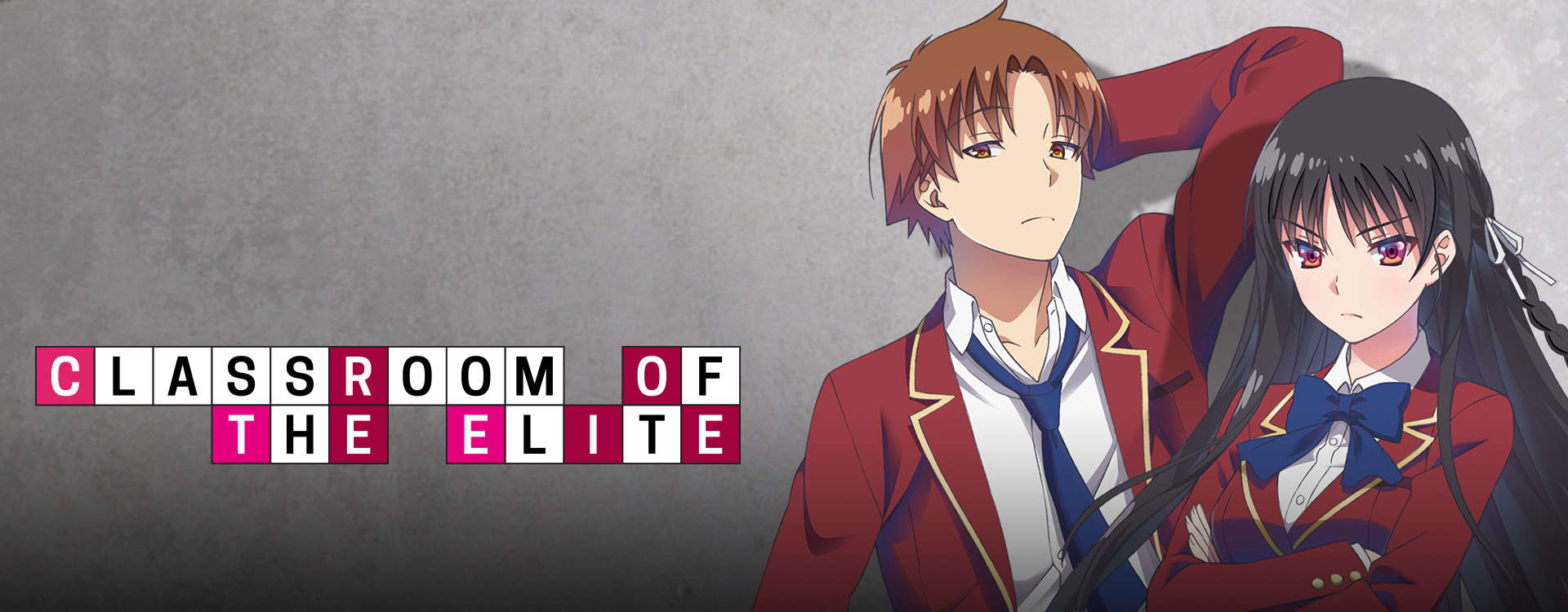 The Classroom of the Elite (2017): “In the not too distant future, the Japanese government has established the Tokyo Metropolitan Advanced Nurturing School, dedicated to instruct and foster the generation of people that will support the country in the future. The students there have the freedom to wear any hairstyle and bring any personal effects they desire. Our protagonist is Kiyotaka Ayanokōji, a quiet, unassuming boy who is not good at making friends and would rather keep his distance. He is a student of D-class, which is where the school dumps its inferior students in order to ridicule them. After meeting Suzune Horikita and Kikyō Kushida, two other students in his class, Kiyotaka’s situation begins to change” (
The Classroom of the Elite (2017): “In the not too distant future, the Japanese government has established the Tokyo Metropolitan Advanced Nurturing School, dedicated to instruct and foster the generation of people that will support the country in the future. The students there have the freedom to wear any hairstyle and bring any personal effects they desire. Our protagonist is Kiyotaka Ayanokōji, a quiet, unassuming boy who is not good at making friends and would rather keep his distance. He is a student of D-class, which is where the school dumps its inferior students in order to ridicule them. After meeting Suzune Horikita and Kikyō Kushida, two other students in his class, Kiyotaka’s situation begins to change” ( My Hero Academia (2016-2017): “A new phenomenon has appeared among mankind. 80 percent of the population possess superpowers known as “Quirks”, and this gave birth to the rise of heroes and villains. Being a hero has always been high school student Midoriya Izuku’s dream, and All Might, the greatest hero of all, is his all-time inspiration. Unfortunately, Midoriya learns that he possesses no Quirks and is fated never to become a hero at all. One day, he gets rescued by none other than All Might himself after being attacked by a villain. Little did he know that on that fateful day, he learned All Might’s deepest secret, one that would change his life forever and what it means to follow All Might’s footsteps” (
My Hero Academia (2016-2017): “A new phenomenon has appeared among mankind. 80 percent of the population possess superpowers known as “Quirks”, and this gave birth to the rise of heroes and villains. Being a hero has always been high school student Midoriya Izuku’s dream, and All Might, the greatest hero of all, is his all-time inspiration. Unfortunately, Midoriya learns that he possesses no Quirks and is fated never to become a hero at all. One day, he gets rescued by none other than All Might himself after being attacked by a villain. Little did he know that on that fateful day, he learned All Might’s deepest secret, one that would change his life forever and what it means to follow All Might’s footsteps” ( Psycho-Pass (2012-2013): “In the near future, Japan has taken a strong stance for isolationism and has created its own self-sufficient bubble controlled by a series of supercomputers. By implanting a chip into the brains of its citizens, this society has cracked the code to people’s inclinations, aptitudes and psychological well being. As a result, crime has been almost eradicated, and employment is practically pre-determined based on the person’s metrics. The show follows the lives of a series of police officers who investigate the few crimes the system failed to predict, and bring in the perpetrators for rehabilitation. However, should the algorithms decide that the criminals cannot be salvaged, they are exterminated on the spot” (
Psycho-Pass (2012-2013): “In the near future, Japan has taken a strong stance for isolationism and has created its own self-sufficient bubble controlled by a series of supercomputers. By implanting a chip into the brains of its citizens, this society has cracked the code to people’s inclinations, aptitudes and psychological well being. As a result, crime has been almost eradicated, and employment is practically pre-determined based on the person’s metrics. The show follows the lives of a series of police officers who investigate the few crimes the system failed to predict, and bring in the perpetrators for rehabilitation. However, should the algorithms decide that the criminals cannot be salvaged, they are exterminated on the spot” ( Sword Art Online (2012): “In the year 2022, a game called Sword Art Online is released. It is a virtual reality massive multiplayer online role-playing game that is played with a helmet called the Nerve Gear. One day the players discover that they are unable to log out. The creator of the game, Akihiko Kayaba, informs them that they cannot escape until they beat the game, and if they die in the game, they will die in real life. The swordsman Kirito’s quest to escape this life and death game now begins” (
Sword Art Online (2012): “In the year 2022, a game called Sword Art Online is released. It is a virtual reality massive multiplayer online role-playing game that is played with a helmet called the Nerve Gear. One day the players discover that they are unable to log out. The creator of the game, Akihiko Kayaba, informs them that they cannot escape until they beat the game, and if they die in the game, they will die in real life. The swordsman Kirito’s quest to escape this life and death game now begins” ( Monster (2004-2005): “Doctor Tenma Kenzou is one of the best brain surgeons in the world. But one day he decides to perform surgery on a 10 year old over the City’s Mayor. After saving the boy, the Director of the Hospital and the Doctors that worked in the Mayor show up dead in the hospital, and the boy who Dr. Tenma saved is missing, along with his twin sister. 9 years later a patient of Dr. Tenma is murdered and the cops place him as the main suspect, but Dr. Tenma knows who did it; the boy he saved 9 years ago, he revived a Monster then and he must kill the Monster now, before more murders occur” (
Monster (2004-2005): “Doctor Tenma Kenzou is one of the best brain surgeons in the world. But one day he decides to perform surgery on a 10 year old over the City’s Mayor. After saving the boy, the Director of the Hospital and the Doctors that worked in the Mayor show up dead in the hospital, and the boy who Dr. Tenma saved is missing, along with his twin sister. 9 years later a patient of Dr. Tenma is murdered and the cops place him as the main suspect, but Dr. Tenma knows who did it; the boy he saved 9 years ago, he revived a Monster then and he must kill the Monster now, before more murders occur” (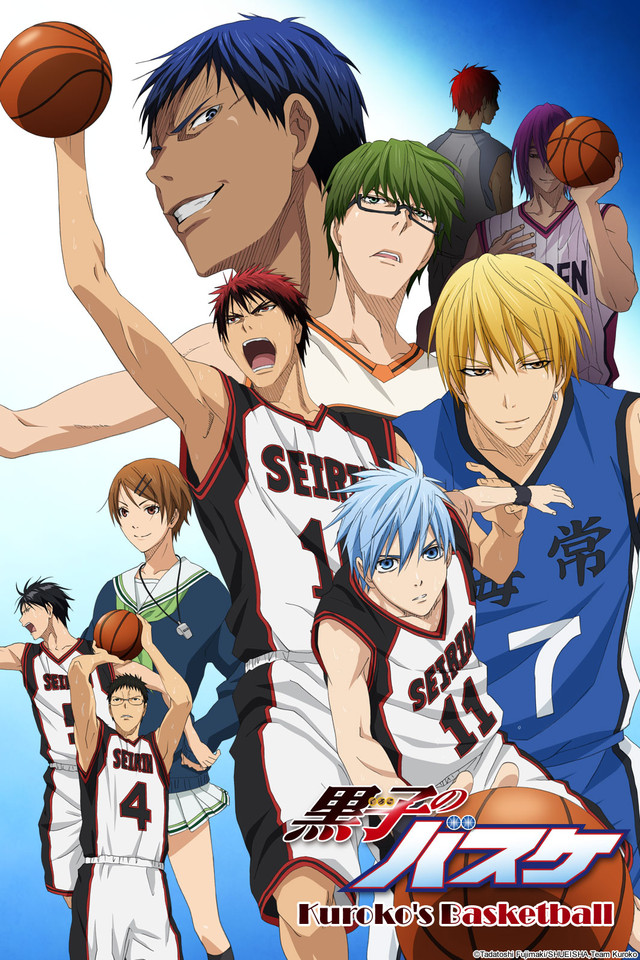 Kuroko’s Basketball (2012-2015): “The Teikō Middle School basketball team had been labelled unrivaled after winning for three consecutive years every championship game they were in. This impressive track record was attributed to the star players, whose exceptional skill and raw talent earned them the moniker ”Generation of Miracles”. Following graduation, each member of the Miracles went on their separate way to join different high school basketball teams. Kuroko Tetsuya, once part of this undefeated team as a sixth member who earned the acknowledgement and respect of the others, decides to enlist in Seirin High School’s basketball club. There he meets Kagami Taiga, a basketball player with promising ability, and they both make a pledge to defeat the Generation of Miracles and become the top players in Japan” (
Kuroko’s Basketball (2012-2015): “The Teikō Middle School basketball team had been labelled unrivaled after winning for three consecutive years every championship game they were in. This impressive track record was attributed to the star players, whose exceptional skill and raw talent earned them the moniker ”Generation of Miracles”. Following graduation, each member of the Miracles went on their separate way to join different high school basketball teams. Kuroko Tetsuya, once part of this undefeated team as a sixth member who earned the acknowledgement and respect of the others, decides to enlist in Seirin High School’s basketball club. There he meets Kagami Taiga, a basketball player with promising ability, and they both make a pledge to defeat the Generation of Miracles and become the top players in Japan” (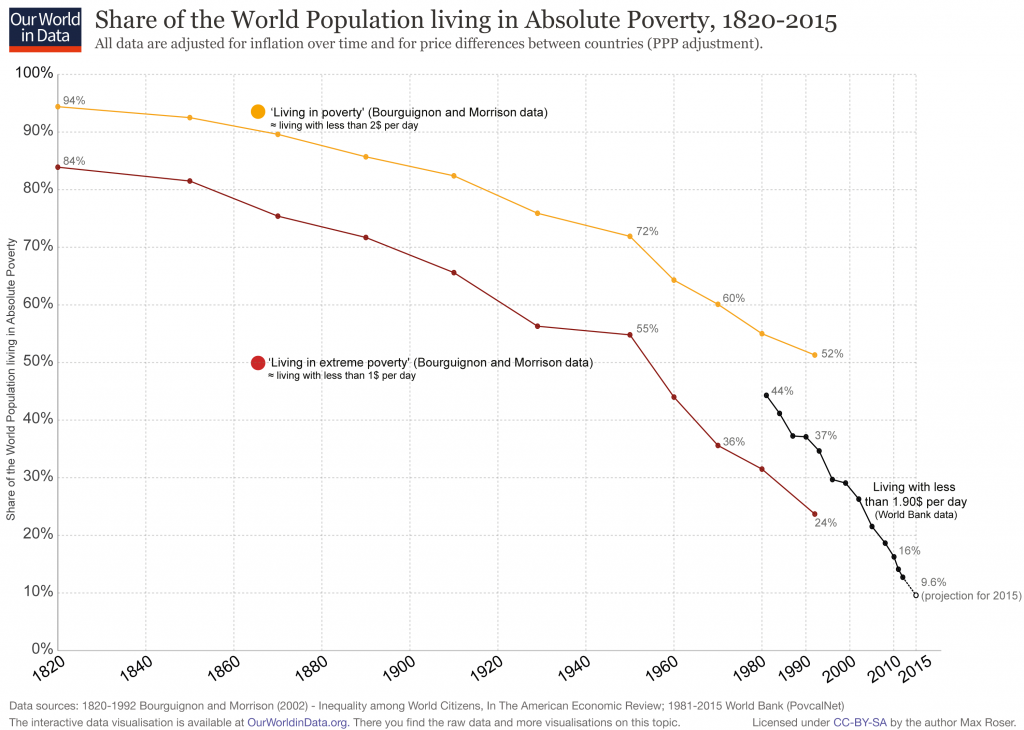

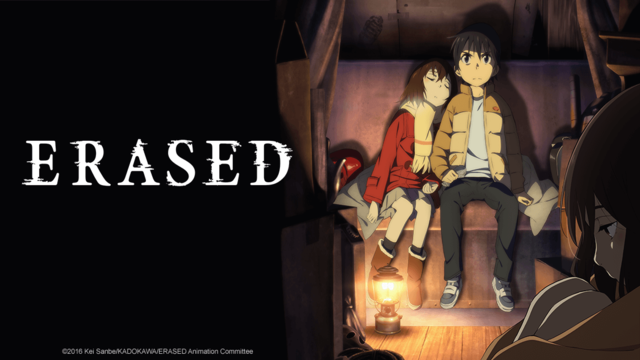
 The story follows Satoru, a 29-year-old loner who experiences what he calls “Revival”: jumps backward in time–signaled by a mystic blue butterfly–moments before deadly events occur. These “revivals” are usually only about 1-5 minutes. However, when his mother (a former journalist) digs up an old kidnapping case and is herself murdered by the kidnapper,[ref]This is the first episode, so it’s not much of a spoiler.[/ref] Satoru’s revival takes him back 18 years to grade school prior to the original kidnappings that set all of the story’s events in motion. As a child with the memories of his 29-year-old self, Satoru seeks to befriend the kids that would eventually end up as victims in an attempt to save them and catch the killer. While the series is wracked with tension from the unfolding murder mystery, the emotional resonance is particularly potent[ref]The breakfast scene![/ref] as the show delves into the subjects of loneliness, abuse, and finding joy in the relationships we create.
The story follows Satoru, a 29-year-old loner who experiences what he calls “Revival”: jumps backward in time–signaled by a mystic blue butterfly–moments before deadly events occur. These “revivals” are usually only about 1-5 minutes. However, when his mother (a former journalist) digs up an old kidnapping case and is herself murdered by the kidnapper,[ref]This is the first episode, so it’s not much of a spoiler.[/ref] Satoru’s revival takes him back 18 years to grade school prior to the original kidnappings that set all of the story’s events in motion. As a child with the memories of his 29-year-old self, Satoru seeks to befriend the kids that would eventually end up as victims in an attempt to save them and catch the killer. While the series is wracked with tension from the unfolding murder mystery, the emotional resonance is particularly potent[ref]The breakfast scene![/ref] as the show delves into the subjects of loneliness, abuse, and finding joy in the relationships we create.
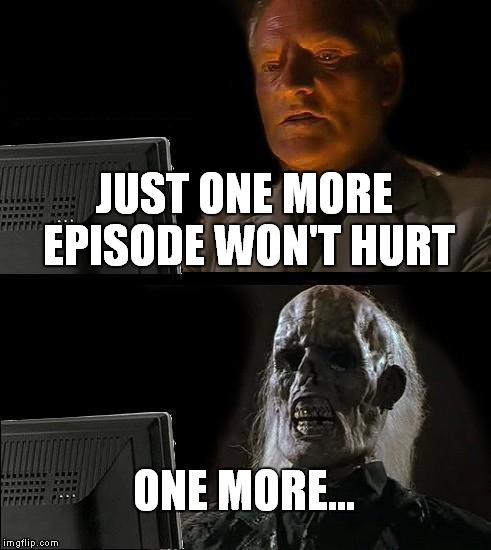
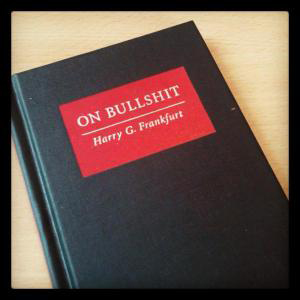 Several years ago, philosopher Harry Frankfurt released his brief essay
Several years ago, philosopher Harry Frankfurt released his brief essay 
